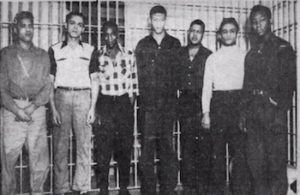
The Martinsville Seven
*On this date in 1949, the Martinsville Seven episode began. They were a group of seven Black men from Martinsville, Virginia, who were convicted and executed in 1951 for raping a white woman in 1949.
The rapes occurred after Ruby Stroud Floyd, a 32-year-old white woman, entered a black neighborhood in Martinsville, Virginia, to collect money for clothing she had sold. She had previously distributed Jehovah's Witnesses materials in the neighborhood. Residents warned her not to stay too long, noting the time as late afternoon. She passed four men at the railroad tracks and continued into the neighborhood, where she was later assaulted by some of those four and other men.
At 7:30 p.m., after dark, she went to Mary Wade's house for shelter, showing signs of an assault. The Wades called an ambulance for her. Based on her account, she claimed to have been raped by several black men, and the police arrested Frank Hairston Jr. and Booker Millner. Four more suspects were arrested that night based partly on the first two men's confessions. The last to be arrested, Joe Hampton, was taken into custody on January 10. After being held by police overnight, the first six all signed confessions, implicating themselves and each other. All but one man was in his early 20s. All admitted to being present at the crime, including Joe Hampton, although not all took part in the rape. Only one of the accused had a prior criminal record, and most of them were employed.
The officials separated the men. To protect them from mob violence, they took them to other jails outside Henry County. The preliminary hearing occurred about a month later, and the grand jury two months after that. A grand jury (which included both black and white jurors) indicted all the men. Their quick arrest assured the community that stability was being preserved. Authorities showed increased professional conduct and procedures since the controversial arrest and execution of Odell Waller during World War II (he was initially represented at trial by the Trotskyite Revolutionary Workers League and ultimately executed).
Frank Hairston Jr., age 20, confessed to raping Booker T. Millner, age 22, and said he was present but did not take part. Based on their confessions, the police arrested Howard Lee Hairston, age 20, who denied having sex with Floyd. He and his older brother (below) were not related to Frank Hairston Jr., James Luther Hairston, age 22, John Claybon Taylor, age 23, Francis DeSales Grayson, age 38, and of Richmond, Virginia, denied having sex with Floyd, the only defendant without local ties. At their arrest, all but one were between 18 and 23. They were quickly tried in six separate trials (two agreed to be tried together), and each was convicted and sentenced to death.
When the NAACP appealed their convictions, its defense team noted that when the police had questioned the men, they had been drinking for some time, and they were not allowed to consult with lawyers or their families. The Civil Rights Congress defended the men initially and later conducted two marches and other attempts to raise awareness and conduct a public campaign on behalf of their plan. This was objected to by the NAACP, who feared further backlash because of the CRC's Communist affiliations.
Martin A. Martin and other NAACP attorneys defended the men on appeals, attempting to ensure fair trials, set due process precedents, and gain clemency or sentence reductions. The case attracted national newspaper coverage. The NAACP appeals also noted that since Virginia started the use of the electric chair, only black men had been executed for rape in the state for what was a non-lethal crime.
Though Governor William Tuck initially agreed to a stay during appellate litigation, by late July 1950, newly elected Governor John S. Battle refused to commute the men's sentences, saying he was horrified by the rapes. The appellate courts upheld the convictions and sentences, and the US Supreme Court twice refused to hear the cases. Four of the Martinsville Seven were electrocuted on February 2, 1951. The remaining three were electrocuted on February 5, 1951. It was the largest mass execution for rape reported in the United States. Historian Eric W. Rise said this case "demonstrated the power of the southern legal system to enforce codes of racial behavior."